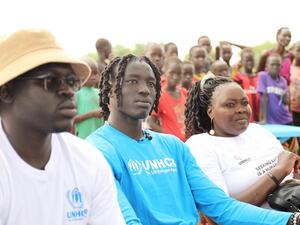UNHCR protects vulnerable as South Sudan airlift helps thousands of displaced
UNHCR protects vulnerable as South Sudan airlift helps thousands of displaced

Emergency food supplies are unloaded from a UN helicopter in the village of Dorein in Jonglei state, South Sudan where tens of thousands of people have been displaced by fighting.
LABRAB, South Sudan August 15 (UNHCR) - Humanitarian organizations in South Sudan are working to deliver emergency assistance to some of the tens of thousands of people displaced by armed conflict in Jonglei state.
Since mid-July, an airlift has been providing food to families in two previously inaccessible villages where humanitarian agencies have established temporary bases. As part of the "cluster approach" to humanitarian emergencies, which brings together partners working in the same sector, the UN refugee agency is leading the protection cluster to ensure the needs of vulnerable individuals among the displaced are addressed.
Maria Ferrante, an associate protection officer with UNHCR based in the town of Bor was among those who established a camp for aid workers in the isolated village of Labrab, which is now home to many families who fled fighting in other parts of the state.
"When we arrived there was nothing," she said. "The grass was up to our shoulders. Now we have established a base for humanitarian organizations, a food distribution point and helicopters carrying food aid arrive every day."
Up to four airlifts a day deliver food rations to families in Labrab and a second village called Dorein. Food distributions take place most days of the week, providing a 15-day supply of sorghum, lentils, cooking oil and salt. Many registering for the assistance have walked for hours from outlying villages. As thousands of people converge on distribution points, Ferrante and staff of partner agencies monitor the crowds to ensure that vulnerable persons such as single mothers, unaccompanied children or the elderly are identified and receive assistance.
''As a result of the ongoing security restraints, UNHCR and our protection partners in Jonglei have been focussing on creating a protective environment that is conducive to fair and equal assistance distributions to the beneficiaries with particular attention to those extremely vulnerable individuals," said Mubashir Ahmad, who heads the UN refugee agency's office in Bor. "In a broader sense, our role is to ensure that the principle of 'do no harm' is at the centre of the humanitarian response."
More than 100,000 people are estimated to have been displaced by the fighting in Jonglei, the largest of South Sudan's 10 states. The clashes have largely been between the Lou Nuer and Murle tribes which have a long history of armed raids on each other's cattle herds. In 2012, a Murle leader launched a rebellion against government forces.
Most of those uprooted have fled into the bush or walked for days to reach villages away from the fighting. Others have journeyed even greater distances to find sanctuary in the neighbouring countries of Kenya, Ethiopia and Uganda. Gaining access to those affected in an insecure and isolated area has been a significant challenge for aid workers.
Stella Rachu is a young mother of four who has not seen her husband since the family fled their home in the town of Boma in May as the fighting intensified. Carrying her two youngest and with her older children running alongside, Stella and others in her community dashed into the bush in the dead of night. For weeks the group lived on the leaves of an edible plant and on the oil extracted from the lulu fruit.
Last month, Stella heard about the food distributions in Labrab. Fluent in English, she now works for a non-governmental organization involved in the emergency response while she searches for news of her husband. "I pray in my heart every night that he is well," she said. "I have no news since that night, but I know we will meet again somewhere soon."
More than 10,000 people in Dorein and some 7,000 in Labrab have been provided with food rations since the operation begun. The United Nations' Humanitarian Coordinator in South Sudan has called on all parties in the conflict to ensure civilians in Jonglei are able to move freely and in safety in order to access humanitarian aid where it is available.
By Tim Irwin In Labrab, South Sudan








